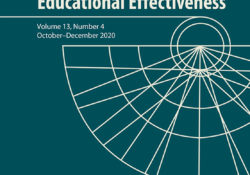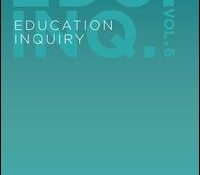tandfonline.com har udgivet en rapport under søgningen “Teacher Education Mathematics”: ABSTRACT ABSTRACT It is vital that the next generation of young people develop scientific skills to ensure global environmental sustainability and the capacity to solve many of the global problems caused by narrow scientific thinking. The aim of this article is to discuss the interest on studying science of primary school students and how to engage them in science education. We explore the perceptions of 709 sixth-grade students from Spain aged between 11 and12 with regard to studying science using a questionnaire entitled Scientific Competencies. Our findings show that there is a growing interest in science motivated by the engagement of primary school students in scientific learning that is transferable to daily life. We discuss how this optimistic result could… Continue Reading →
Like this:
Like Loading...
tandfonline.com har udgivet en rapport under søgningen “Teacher Education Mathematics”: ABSTRACT ABSTRACT This overview gives a background for this special issue of the International Journal of Science Education on Aesthetics, affect, and making meaning in science education. Contributions to this special issue examine how and what kind of aesthetics of science is constituted when it meets the aesthetics of other practices (e.g. arts, mathematics, student lives), in and outside classrooms, and the consequences these encounters have for meaning-making and in learning science. It reviews various traditions and concepts used in studying aesthetics and affect in science education, their theoretical foundations and the different meanings these traditions assign to the concepts. The review spans from cognitivist, causal approaches to socio-culturally and pragmatically-oriented stances and examines the educational questions that these frameworks… Continue Reading →
Like this:
Like Loading...
tandfonline.com har udgivet en rapport under søgningen “Teacher Education Mathematics”: ABSTRACT ABSTRACT Asking questions is an important way of acquiring information and knowledge and plays a significant role in a child’s learning processes. In this study, we examine what characterises the questions asked by children to their teachers in two kindergartens (4–6-year-olds) and six primary school classes (2nd–4th grade) when situated in a natural outdoor environment. Recordings are undertaken by means of action cameras and audio recorders. We also examine the contexts in which the questions are asked. We found that whereas the preschool children’s science topic questions mostly concerned subject matter (74–95%), the schoolchildren more often asked practical questions. Our findings indicate that providing the children with activities that open for the children’s own explorations of a variety of… Continue Reading →
Like this:
Like Loading...
tandfonline.com har udgivet en rapport under søgningen “Teacher Education Mathematics”: ABSTRACT ABSTRACT Background: Creativity is an important skill for the future society and developing students’ creativity is an important part of science education. Working on a creative science project may help developing students’ creative abilities, and the interaction between teacher and students during the work on defining a problem and solving the problem, is an ideal forum for supporting students’ creativity. Purpose: The purpose of the study is to get insight into how teachers respond to students’ creative ideas during the works on a creative science project, and how the interaction between teacher and students may support or inhibit students’ creative abilities. Design and methods: Data in this study consist of 49 video-recorded interactions between two teachers and student groups… Continue Reading →
Like this:
Like Loading...
tandfonline.com har udgivet en rapport under søgningen “Teacher Education Mathematics”: ABSTRACT ABSTRACT PISA (Programme for International Student Assessment) is one of two large scale international comparative projects of student assessment that now exert considerable influence upon school science education policy, the other being TIMSS (Trends in International Mathematics and Science Study). This paper focuses on PISA, now the most influential study. This article outlines the origins of PISA, identifies some of the challenges in its construction and the claims made for it. It argues that while the statistical and methodological aspects of PISA have received much research attention, other elements of PISA have been largely ignored. In particular, there are several outcomes of PISA testing that point towards a significant research agenda. In addition, the political, ideological and economic assumptions… Continue Reading →
Like this:
Like Loading...

tandfonline.com har udgivet en rapport under søgningen “Teacher Education Mathematics”: Abstract Abstract Combinations of text and different types of pictures are commonplace in biology as in science in general. The single representations (i.e., text, picture) constituting a text–picture combination may contain redundant or complementary information. The ability to identify and integrate information in different kinds of text–picture combinations is indispensable for engaging in science and is normatively expected to be acquired in school. In this experimental study, which was not preregistered in an independent institutional registry, N = 240 undergraduate students worked on 2 constructed-response biology tasks originating from authentic final exams to obtain the higher education entrance qualification. The material carried equivalent information between conditions but consisted of redundant or non-redundant text–picture combinations or only texts. Analysis of variance revealed negative… Continue Reading →
Like this:
Like Loading...
tandfonline.com har udgivet en rapport under søgningen “Teacher Education Mathematics”: ABSTRACT ABSTRACT In science education, critical discussions on the engagement of industrial actors in STEM education are scarce. In this study, we take the perspective that industrial STEM education initiatives are an arena for governing STEM education. The aim is to contribute to a critical discussion on the involvement of industrial actors in STEM education by scrutinizing how they describe their engagement. More specifically, we look at the discursive repertoires industrial actors put forward as rationales for engaging in STEM education initiatives. The data consist of web materials wherein industrial actors describe and justify their engagements. We identify the following interpretative repertoires used by industrial actors when justifying their engagement in said initiatives: a) Securing competent labour, b) Securing economic… Continue Reading →
Like this:
Like Loading...
tandfonline.com har udgivet en rapport under søgningen “Teacher Education Mathematics”: ABSTRACT ABSTRACT Enterprise education is a policy-driven, cross-curricular phenomenon on many Western countries’ educational agendas. The expectation is that it will be implemented in different school subjects, but bridging enterprise education and different school subjects has proven to be a challenge. This article explores whether and how open-ended investigations in science education in secondary schools can be viewed as a form of enterprise education. We identify several points of contact, illuminating the premises on which enterprise education can be integrated into science education. Thus, the results contribute to the under-researched field of bridging enterprise education with school subjects in secondary education. Link til kilde
Like this:
Like Loading...
tandfonline.com har udgivet en rapport under søgningen “Teacher Education Mathematics”: ABSTRACT ABSTRACT Background: Research on peer assessment has noted ambiguity among students in using peer assessment for improving their work. Previous research has explained this in terms of deficits in the student feedback, or differences in student views of what counts as high-quality work. Purpose: This study frames peer assessment as a social process in the science classroom. The aim is to explore peer assessment in science education as social practice in order to contribute to an understanding of the affordances and constraints of using peer assessment as a learning tool in science education. Design and Method: The study was conducted in four lower secondary school classes, school years 8 and 9, in two different schools. An intervention study was… Continue Reading →
Like this:
Like Loading...
tandfonline.com har udgivet en rapport under søgningen “Teacher Education Mathematics”: ABSTRACT ABSTRACT Numerous initiatives are carried out across the world to support science teaching in early childhood education. However, professional development research shows that in order for teaching interventions to bring about successful changes in practice, it is key that teacher’s beliefs, confidence and knowledge change. As a complement to studies showing how teachers change, this article examines why teachers adopt a pedagogical idea for teaching science in preschool. Drawing on Clarke and Hollingsworth’s model for teacher professional growth, the article analyses interviews with teachers that have implemented and developed a pedagogical idea for teaching science in preschool. The results indicate that teachers adopt the pedagogical idea because it helps them to discern and build on science content in everyday… Continue Reading →
Like this:
Like Loading...









